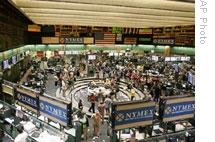VOA慢速英语-Economics Report - Throwing Light on High Oil Prices
搜索关注在线英语听力室公众号:tingroom,领取免费英语资料大礼包。
(单词翻译)
Some blame speculators for recent increases, but others see market supply and demand at work. The I.M.F. will investigate.
19 June 2008
This is the VOA Special English Economics Report.
First a crisis, then calls to investigate. This is happening now with high oil prices.
 |
| The New York Mercantile Exchange began trading oil futures1 in 1983 |
Last Saturday, in Japan, finance ministers of the Group of Eight countries urged oil producing countries to increase production. But they also called on the International Monetary2 Fund and the International Energy Agency to jointly3 examine the recent price rise.
I.M.F. chief Dominique Strauss-Kahn said that some G-Eight ministers were concerned about financial speculation4. How important it is and what influence it has on the market will be investigated, he says. A report is expected in October.
In the United States, government agencies are already looking for ways to increase supervision5 of oil markets.
The Commodity Futures Trading Commission just reached an agreement with a London electronic exchange, ICE Futures Europe. ICE, the Intercontinental Exchange, agreed to observe the same trading limits as American markets. Some people have called ICE Futures Europe a "dark market," a market with little supervision.
Regulators want to know more about who is trading in oil futures. A futures contract is an agreement to buy or sell a quantity of a product at a set price and date in the future. The New York Mercantile Exchange began trading oil futures in nineteen eighty-three.
Futures markets now largely set the price of oil. Yet these contracts rarely involve an exchange of real barrels of oil. Most oil is traded on what is called the spot market or through other contracts between producers and users. The prices, however, are usually based on futures prices.
Doug MacIntyre is senior oil analyst6 with the United States Energy Information Administration. He notes that the position of the government is that market forces of supply and demand are driving today's high oil prices. But he also notes that more money has been going into futures.
This money can be from oil producers and users. But it also comes from banks, big investors7 called hedge funds and speculators with no need for oil. Speculators try to guess the direction a market will go; in some cases they profit when prices drop.
Treasury8 Secretary Henry Paulson and others say it is not clear that speculators are to blame for high oil prices. They say markets need buyers and sellers willing to take more risk than average investors. But critics say oil prices have gone up too quickly recently to be explained by supply and demand alone.
And that's the VOA Special English Economics Report, written by Mario Ritter. I'm Steve Ember.
 收听单词发音
收听单词发音 




